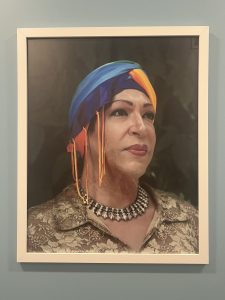 I’ve been working at Heartland Human Care Services’ Refugee and Immigrant Community Services (RICS) team for a little over a week, but it feels like I’ve gained at least two months of experience. I already have a well-established commute, taking the red line north through Old Town, Lincoln Park, and finally arriving at Uptown. I admire the artwork decorating the walls and street throughout the neighborhood as I walk the three blocks from the train station to Heartland. So far, I’ve had a habit of showing up early—when you’re taking the “L,” arriving just on time is a gamble against train delays and track repairs.
I’ve been working at Heartland Human Care Services’ Refugee and Immigrant Community Services (RICS) team for a little over a week, but it feels like I’ve gained at least two months of experience. I already have a well-established commute, taking the red line north through Old Town, Lincoln Park, and finally arriving at Uptown. I admire the artwork decorating the walls and street throughout the neighborhood as I walk the three blocks from the train station to Heartland. So far, I’ve had a habit of showing up early—when you’re taking the “L,” arriving just on time is a gamble against train delays and track repairs.
Once I arrive, I meet up with my supervisor, and I follow her along to whatever meetings or training we have scheduled for the day. She has a practical teaching style, showing me how to complete a task, and then assigning me that task in a more official capacity. By now, she’s walked me through how to call participants (the clients we work with) with a translator app, conduct follow-up interviews, apply for financial assistance, and write case notes to update a participant’s file. I’ve also now taken on a caseload of my own to fill in for a case manager who is out of town for a couple months, allowing me to put my skills and training to the test. It has already been really rewarding to be able to support immigrants and refugees in whatever small ways I can.
One of the largest themes during my time at Heartland so far has been change—or perhaps more aptly, accommodation. With so much federal policy change taking place that directly affects the population we’re working with, Heartland has had to adapt. There have been very few new participants since January, meaning that one of RICS’ major tasks, intake, is often no longer applicable. Instead, my team is working more closely with participants who have already been in the country for at least a few months. This is just one of many large changes that is happening, as teams are absorbed or expanded and as caseloads change hands. I am inspired not only by the organization’s flexibility, but also by their stalwart determination to continue to serve this community in every way they can, despite the ever growing pile of roadblocks they face.
Another—and more personal—pattern I’ve encountered occurs when my coworkers ask me about my college major. When I tell them I did my undergrad in criminology, I often get a polite yet confused variation of, “Why did you decide to work here then?” I understand the question; at surface level, criminology doesn’t appear to have much to do with immigrant and refugee services. Despite my explanation that there is quite a bit of overlap between criminological theory and immigration—see the way some politicians choose to label those who enter the United States without documentation as criminals, even though many flee to our country out of fear for their lives—there is some part of me that wonders about my end goal. Though I am passionate about immigrant and refugee rights and eager to help out the community, it’s too early to be certain whether this kind of work is my calling. I have had perhaps an unusually diverse amount of experiences and jobs for someone my age. I’ve worked at restaurants and coffee shops. I’ve been a tutor and a Resident Assistant. I’m in the National Guard. I’ve taken a class inside a prison and one in Norway. I’ve conducted a year-long research project, interned with the State Police, and am now interning with a non-profit to support immigrants and refugees. All of these experiences have expanded my perspective in their own unique way. My time at Heartland is not only showing me a new and exciting possibility, but also teaching me how to adapt and remain hopeful in the face of change.
Dani Schulz, Heartland Alliance